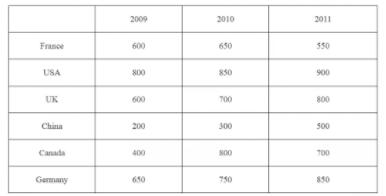Task 1
The table below shows the number of people having private cars in every 1,000 people in six countries in 2009, 2010 and 2011.

既可以用“比较”法来写作,也可以用“(线性)变化”法来写作:因为时间是连续的
推荐:按照“(线性)变化”法来写作
信息加工,确定写作内容:
1) 一路升:the US, the UK, China, Germany:China最突出(2010年的300到2011年的500),其他国家稳定升,在三年里都是minimum;
2) 升了降:France, Canada
3) 同时有“比较”:the US在三年里都是maximum。
[Introduction] The table presents information about the ownership of private cars in every 1,000 people in six countries in three years – 2009, 2010 and 2011.
[Body] China was most noteworthy among the countries where private car ownership kept increasing during the three-year period. In the US, the UK and Germany, the growth was steady, either 50 or 100 cars a year. In China, there was an annual increase of 100 cars between 2009 and 2010, and the number spiked to 500 in 2011. In addition, China is noticeable also because its car ownership was lower than that of any other country throughout the three years.
Every 1,000 French people owned 600, 650 and 550 cars in the three years, and the fluctuating car ownership also happened in Canada, where the number varied significantly between the years, surging [surge] from 400 to 800 and then sliding [slide] to 700. It is also that all of the three years witnessed that the US had the highest car ownership. 【主语的频繁变化;语法现象的多样(Grammatical Range);表示变化/趋势的动词(及对应的名词)】
[Conclusion] 略
Task 2
In many countries, more and more women have full-time jobs as men, so it is logical that men and women should share the housework tasks equally.
To what extent do you agree or disagree with this opinion?
[Introduction]
Doing housework should not be exclusively females’ department [习语性表达]. Instead, men should also roll up their sleeves [形象的表达] rather than sit in the couch [形象的表达]. However, the proposed equality in amount is unreasonable.
[Body] There have been increasing numbers of women who do not take being a housewife for granted. They are full-time employees, who find it difficult to juggle their careers with taking care of their households. At this point, it is fair that the husbands take some of the responsibility. However, does this mean that the wife and husband share the chores evenly? [故意提问/设问] The answer is an obvious “no”. [短句给出一个方向,具体关于“为什么”的信息后面用长句说明] A wife and her husband are likely to have different timetables, although they both work full time, and the different arrangements hardly permit the couple to divide the household in equal halves. Therefore, if the male works longer hours, it is reasonable for the wife to expect her husband to do some and unreasonable to expect the man to do the same.
In addition, although the wife also earns a salary, she may follow a 9-5 timetable. The husband, however, are likely to work overtime and bring home a bigger paycheck. If the economic contribution is unbalanced and the imbalance is acceptable, why is the unequal allocation of housework unacceptable? [故意提问/反问] As a matter of fact,as long as a global balance – that the man brings home more bread and butter while the woman washes more clothes and dishes [不是真的只是“洗衣洗碗”,而是泛指家务] – may be maintained, the proposed equality is unnecessary.
[Conclusion]
In light of the above, housework should not be done solely by women. However, it may go too far if we expect men and women share the work equally. My conviction is strong that it cannot be bent by any opposition.
章 跃
新航道国际教育集团写作学科带头人,新航道南京学校雅思托福写作学科带头人,阅读写作钻石级团队。澳大利亚拉筹伯大学硕士,原澳大利亚EAL教师,师从雅思考官,并与其共事多年。8年雅思教学经验,以及多年的北美考试研究使其对各类留学语言考试了如指掌,独创一套专门解决中国学生写作障碍的行之有效的教学体系,帮助了近千名学生突破写作低分瓶颈之后更不断进步取得写作高分,成功步入国外大学。在教学过程中逻辑清晰并且思维开阔,信手拈来地引经据典而令学生折服。
0元领取剑桥雅思系列真题解析、托福TPO、SAT考试真题,更多独家资料免费领取。
